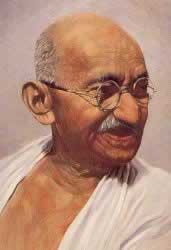Government using HC injunction to stop Gandhi auction
03 Mar 2009
With five of Mahatma Gandhi's personal belongings all set to be auctioned in New York on Thursday, the government is mounting a desperate last-minute bid to 'rescue' these heritage items from private ownership.
 Armed with an interim injunction passed by the Delhi High Court on a plea by the Gandhi-founded Navjivan Trust of Ahmedabad, India is approaching the US to prevent the Mahatma's belongings – a pair of glasses, a pair of worn leather sandals, a pocket watch, and a simple brass bowl and plate – from being auctioned.
Armed with an interim injunction passed by the Delhi High Court on a plea by the Gandhi-founded Navjivan Trust of Ahmedabad, India is approaching the US to prevent the Mahatma's belongings – a pair of glasses, a pair of worn leather sandals, a pocket watch, and a simple brass bowl and plate – from being auctioned.
"The Ministry of External Affairs is going to take up the issue with the US state department with the aim of stalling the auction at Antiquoroum Auctioneeer in New York," tourism and culture minister Ambika Soni said.
The Delhi High Court on Tuesday passed an interim injuction on the plea of Ahmedabad-based Navjivan Trust that these articles could not be sold as they belonged to India and were illegally taken away from this country.
The items are being put up for sale by Los Angeles documentary producer James Otis, who said that he hoped selling the items would popularise Gandhi's creed of passive resistance.
"I've had them many years in my own private hands and I really want them to get out to the world, and I'm hoping that by auctioning them it will make Gandhi relevant in today's world, and help people like Obama, who has got a picture of Gandhi in his office, help him remember that Gandhi taught us to resolve international conflicts with non-violence."
Inquiries from prospective buyers have been pouring in from around the globe, Julian Scherer of Antiquorum said. "We have, you know, high hopes that it either is going to be an institution, a museum, or hopefully even a private wealthy Indian person who might decide to actually give it back to his country or to be on view for most of the public people to be able to actually view it, which is where they really ultimately belong," he said.
Otis added, ''We have gone to the Indian government and made an offer to them: if they were to increase their help to the poorest of Indians, increase their GDP from one per cent to five per cent, I would gladly donate these items to them, and they would be happy and a cause that Gandhi believed in greatly, the poorest of those in India, would benefit."
The auction house said Gandhi is believed to have given the eyeglasses and their leather case to an army colonel who had asked him for inspiration, telling him they were the "eyes" that had given him the vision to free India.
The timepiece is a 1910 Zenith sterling silver pocket watch with an alarm that Gandhi gave to his grandniece, Abha Gandhi. Gandhi also gave the bowl and plate to his grandniece, who worked as his assistant for six years.
Gandhi, who advocated non-violent civil disobedience to resist British rule in India, died in her arms in 1948 after being shot by a Hindu fanatic.
The sandals were apparently given to a British military officer who photographed the leader in the Yemen port city of Aden, where Gandhi had stopped en route to England.
Otis said he acquired them from family members and a variety of auctions.


















